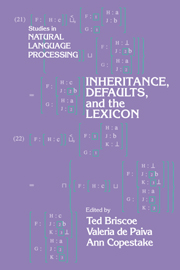Book contents
- Frontmatter
- Contents
- Contributors
- 1 Introduction
- 2 Skeptical and Credulous Default Unification with Applications to Templates and Inheritance
- 3 Prioritised Multiple Inheritance in DATR
- 4 Some Reflections on the Conversion of the TIC Lexicon into DATR
- 5 Norms or Inference Tickets? A Frontal Collision between Intuitions
- 6 Issues in the Design of a Language for Representing Linguistic Information Based on Inheritance and Feature Structures
- 7 Feature-Based Inheritance Networks for Computational Lexicons
- 8 A Practical Approach to Multiple Default Inheritance for Unification-Based Lexicons
- 9 The ACQUILEX LKB: An Introduction
- 10 Types and Constraints in the LKB
- 11 LKB Encoding of Lexical Knowledge
- 12 Defaults in Lexical Representation
- 13 Untangling Definition Structure into Knowledge Representation
- Appendix A A Bibliography of ACQUILEX Papers Connected with the LKB
- Appendix B The LKB Description Language Syntax
- Appendix C Software Availability
- References
- Author index
- Subject Index
4 - Some Reflections on the Conversion of the TIC Lexicon into DATR
Published online by Cambridge University Press: 01 April 2010
- Frontmatter
- Contents
- Contributors
- 1 Introduction
- 2 Skeptical and Credulous Default Unification with Applications to Templates and Inheritance
- 3 Prioritised Multiple Inheritance in DATR
- 4 Some Reflections on the Conversion of the TIC Lexicon into DATR
- 5 Norms or Inference Tickets? A Frontal Collision between Intuitions
- 6 Issues in the Design of a Language for Representing Linguistic Information Based on Inheritance and Feature Structures
- 7 Feature-Based Inheritance Networks for Computational Lexicons
- 8 A Practical Approach to Multiple Default Inheritance for Unification-Based Lexicons
- 9 The ACQUILEX LKB: An Introduction
- 10 Types and Constraints in the LKB
- 11 LKB Encoding of Lexical Knowledge
- 12 Defaults in Lexical Representation
- 13 Untangling Definition Structure into Knowledge Representation
- Appendix A A Bibliography of ACQUILEX Papers Connected with the LKB
- Appendix B The LKB Description Language Syntax
- Appendix C Software Availability
- References
- Author index
- Subject Index
Summary
Abstract
The Traffic Information Collator (TIC) (Allport, 1988a,b) is a prototype system which takes verbatim police reports of traffic incidents, interprets them, builds a picture of what is happening on the roads and broadcasts appropriate messages automatically to motorists where necessary. Cahill and Evans (1990) described the process of converting the main TIC lexicon (a lexicon of around 1000 words specific to the domain of traffic reports) into DATR (Evans and Gazdar, 1989a,b; 1990). This chapter reviews the strategy adopted in the conversion discussed in that paper, and discusses the results of converting the whole lexicon, together with statistics comparing efficiency and performance between the original lexicon and the DATR version.
Introduction
The Traffic Information Collator (TIC) is a prototype system which takes verbatim police reports of traffic incidents, interprets them, builds a picture of what is happening on the roads and broadcasts appropriate messages automatically to motorists where necessary. In Cahill and Evans (1990), the basic strategy of defining the structure of lexical entries was described. That paper concentrated on the main TIC lexicon, which was just one part of a collection of different kinds of lexical information and only dealt with a small fragment even of that. The whole conversion involved collating all of that information into a single DATR description.
- Type
- Chapter
- Information
- Inheritance, Defaults and the Lexicon , pp. 47 - 57Publisher: Cambridge University PressPrint publication year: 1994

